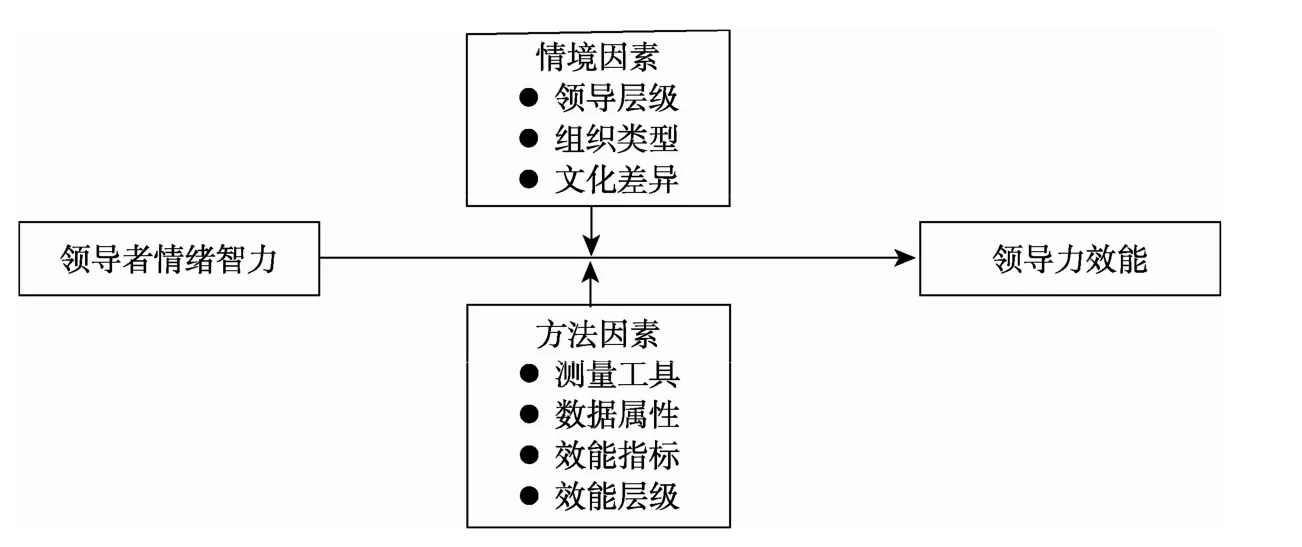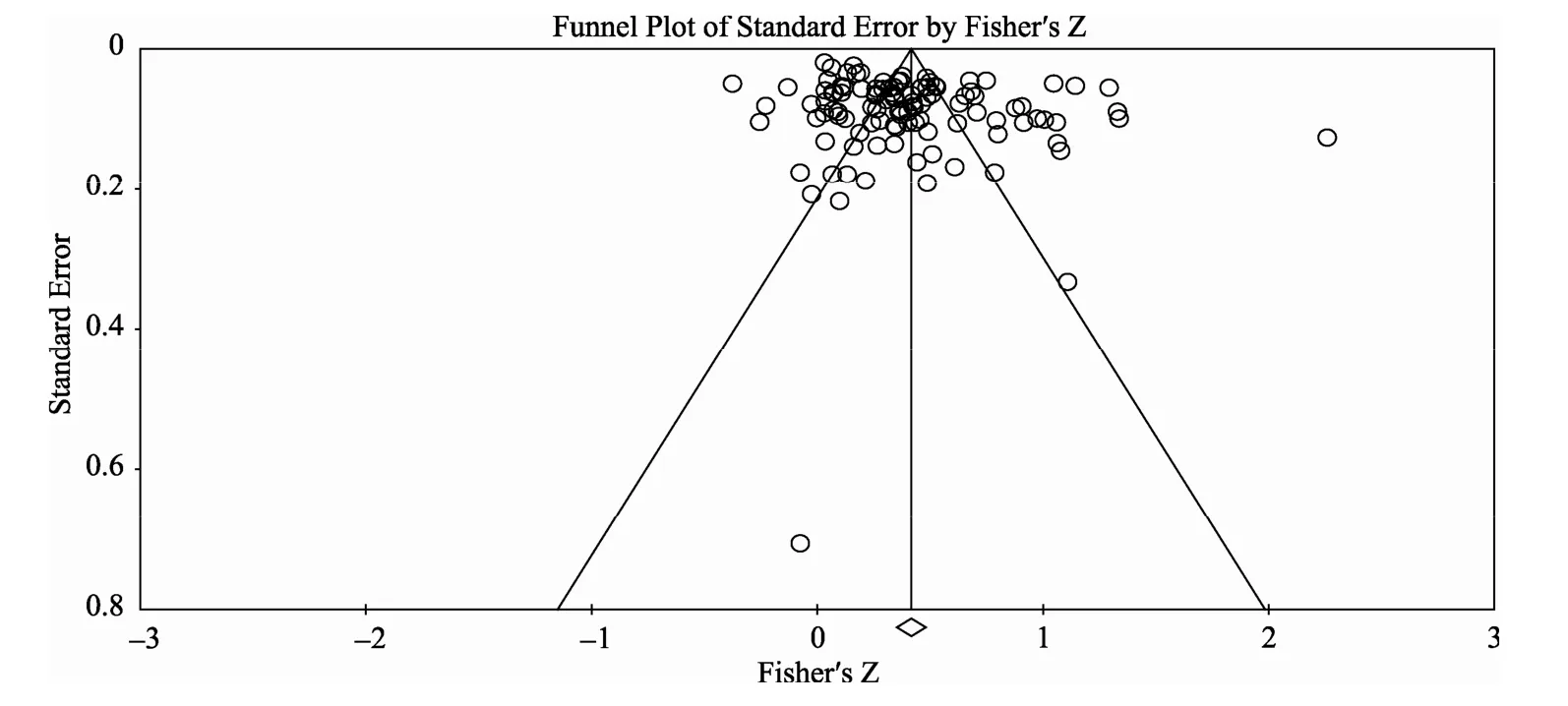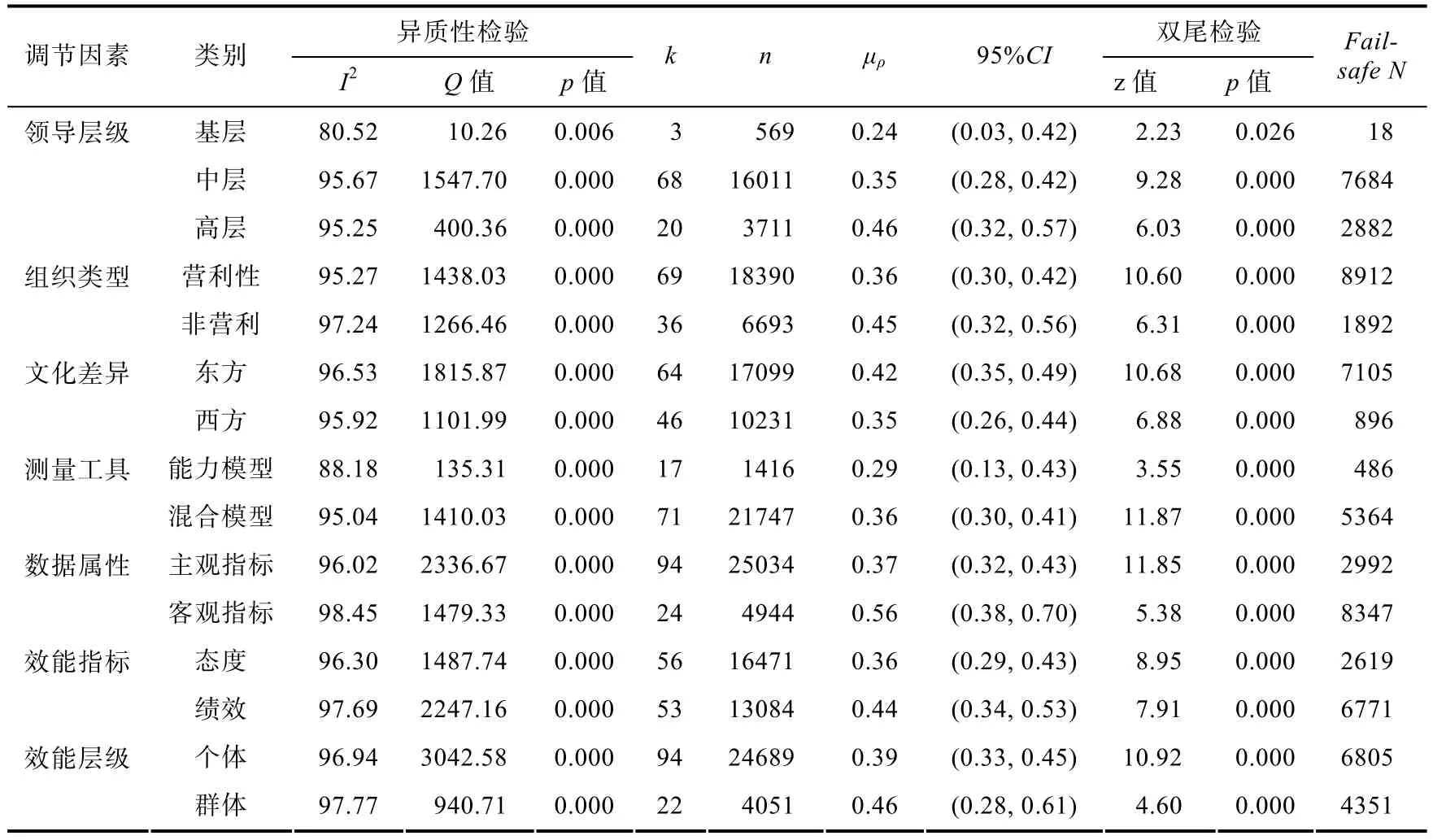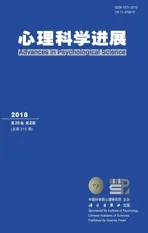领导者情绪智力对领导力效能影响的元分析*
2018-02-04吕鸿江韩承轩王道金
吕鸿江 韩承轩 王道金
(东南大学经济管理学院, 南京 210096)
1 引言
随着管理环境复杂性和任务不确定性的增强, 领导者开始关注通过提升情绪智力(Emotional Intelligence, 简称EQ, 也称情商)适应环境的变化,情商逐渐成为影响领导成败的关键因素(Goleman,1995); 但目前一些传统管理实践仍以强调思维智力(Intelligence Quotient, 简称IQ, 也称智商)为主,忽视了情绪智力的作用。由于人的成就仅 20%源于智商, 另外 80%则要受其它因素, 尤其是情商的影响; Goleman (1998b)在比较了188家跨国企业高管的情商和智商后发现情商对工作绩效的影响是智商的 9倍, 而 McClelland (1998)在对一家全球性食品饮料公司的研究中发现高情商的高层管理者带来的部门年利润比预期目标高 20%; 所以领导者的情商往往比智商发挥着更重要的作用,分析领导者的情绪智力(情商)产生的领导力效能尤为重要。
情绪智力最早由Salovey和Mayer (1990)提出,指个体监控自己及他人的情绪和情感并识别、利用这些信息指导自己的思想和行为的能力。这一概念的提出对领导学研究产生重要影响, 引发学者们开始思考领导者的智商之外的情商带来的领导力效能(Ramo, Saris, & Boyatzis, 2009; van Rooy,Viswesvaran, & Pluta, 2005), 并从不同角度探讨了领导者情绪智力与领导力效能之间关系。研究者们发现情绪智力与领导能力、工作绩效及领导有效性存在密切关系(George, 2000; Goleman, 1998a;Law, Wong, & Song, 2004), 他们大多指出领导者情绪智力有助于提高领导力效能(Herbst & Maree,2008; Jiamsuchon, 2001; Kerr, Garvin, Heaton, &Boyle, 2006; Aloysius, 2010; Reddick, 2007), 但相关研究在二者间的关系强度、方向及显著性上仍存在分歧。而且, 随着领导者情绪智力的研究数量不断激增, 此类分歧日益加剧。所以, 辨析两者之间的关系对推进领导者情绪智力的研究具有重要理论价值。
目前情绪智力研究领域积累了丰富的实证研究成果(Druskat, Sala, & Mount, 2005; Matthews,Zeidner, & Roberts, 2007; Mayer, Salovey, &Caruso, 2008), 为采用元分析探讨情绪智力与领导力效能的关系提供了详实的资料。基于此, 本文将通过对领导者情绪智力与领导力效能关系及其潜在调节变量的元分析, 澄清现有文献在研究结论上的分歧, 并细化影响两者关系产生的情境和方法因素, 以期为领导者情绪智力研究提供新的思路与方向。
2 文献综述与研究假设
2.1 文献综述
2.1.1 情绪智力的概念界定与测量
情绪智力是反映个人理解、控制和利用情绪的能力相关的概念体系, 强调人们在有效地控制其情绪、情感生活的能力方面是存在个体差异的(Salovey & Mayer, 1990)。后来, Mayer和Salovey(1997)把情绪智力定义为准确感知、评价并表达情绪, 爆发和产生促进思考的情感并理解情绪及情感知识, 进而调控情绪以促进情感和智力发展的能力。
近年来, 随着情绪智力概念的发展, 不同学者基于不同的情绪智力概念定义与理论模型, 在研究过程中开发的情绪智力测量方法以及维度都存在差异。目前, 主要有两种情绪智力理论模型(Mayer, Caruso, & Salovey, 2000; Zeidner, Roberts,& Matthews, 2008), 如表1所示。情绪智力的能力模型主要基于认知视角理论, 所涵盖的内容较窄,是将传统智力概念中未测量到的感知、处理及有效管理情绪和情绪信息等能力变量组合形成了情绪智力概念; 而情绪智力的混合模型则是基于综合视角与胜任力视角, 概念界定较为宽泛, 把性格特征、激励因素和相关技能都包含其中, 具有更为丰富的涵义。因此, 学术界通常把前者称为狭义的情绪智力, 而把后者称为广义的情绪智力。虽然不同学者对情绪智力的界定仍存在差异,但情绪智力对于领导者效能的作用已成为共识(George, 2000; Goleman, 1999)。
2.1.2 领导力效能的概念界定与测量
领导力效能(Leadership Effectiveness)也称领导有效性; 它是评估一个领导者领导行为的有效性程度; 它可以是一个群体成功执行其基本分配任务的程度(菲德勒, 加西亚, 1989), 或者个体或群体对他人成功实施个人影响力并最终实现共同目标的程度(Cooper & Nirenberg, 2004)。因此, 领导力效能是领导者为成功达成领导目标, 在领导实施过程中表现出的行为能力、工作状态和工作结果。具体地, 学者们往往把领导力效能看作一个多层次的概念(Judge, Piccolo, & Ilies, 2004;Lowe, Kroeck, & Sivasubramaniam, 1996), 例如,Derue, Nahrgang, Wellman 和 Humphrey (2011)从内容、层次和对象三个方面对它进行了界定:内容是指研究者从效能产出形式考察领导的有效性,如情绪、态度和行为等; 层次是指领导发挥作用的层面, 包括个体、对偶、团队和组织四个层面;对象是指有效性的评价指标是针对领导而言, 还是针对其他对象; 王震、孙健敏和赵一君(2012)在一项领导力效能元分析中, 把群体下属的态度(如满意度、情感承诺等)和行为(如任务绩效、公民行为等)变量作为领导力效能的指标。总体而言,大多数倾向从组织和个体两个层面来评价。
综合上述观点, 我们将从个体层面的工作态度与组织层面的绩效两个方面考察领导者情绪智力对领导者和追随者的个体层面以及团队或组织的集体层面的影响。(1)工作态度是一种稳定持久的感受以及行为倾向, 它能在一定程度上影响并反映人们的行为方式; 主要以员工的工作满意度、组织承诺以及组织公民行为等主观指标来测量。(2)工作绩效是人们在工作中所取得的成绩,反映了领导者在不同层面上运用其领导方式影响员工实现组织目标的有效输出, 包括领导者绩效、员工绩效、团队和组织绩效等客观测量指标。
2.2 领导者情绪智力对领导力效能影响的主效应
情绪智力与领导力效能的关系越来越被更多学者关注。尽管多数研究都认为情绪智力对领导有效性很重要, 但也有部分实证研究表明, 情绪智力不能预测领导力效能, 或只能部分程度预测领导的有效性。鉴于大多数实证研究结果都表明,高水平的领导者情绪智力有利于提高领导力效能;例如, Kerr等(2006)对美国一家大型制造型企业38名领导者, 采用MSCEIT量表收集1258项问卷调查发现情绪智力能够有效的预测领导力效能水平(r=0.50); Aloysius (2010)对斯里兰卡50名具有5年工作经验以上的学校负责人调查发现, 学校领导者的情绪智力和领导力效能存在较高程度的相关关系(r=0.68)。而且, 在中国情境下的相关研究也显示, 领导者情绪智力与领导力效能存在显著的正相关。吴筱玫(2006)对国内企业中高层领导者研究发现, 领导者情绪智力对领导力效能具有显著的预测作用。张辉华、李爱梅、凌文辁和徐波(2009)通过对政府机关和企事业单位 320名管理人员以及制造型企业 12名中层管理者为样本, 发现无论是针对主观绩效还是客观绩效, 管理者情绪智力对绩效都有显著的正向影响。情绪智力在有效领导中扮演着重要的角色, 它有利于提高领导者解决、处理个人和组织面对的问题与机会的能力, 进而实现有效的领导力(George,2000); 而且高情绪智力的领导者能够运用积极的情绪去促进组织职能的实现, 准确地评价员工的感觉, 并且利用这一信息去影响员工的情绪, 使他们理解和支持组织的目标。可见, 情绪智力对于领导者非常重要, 它是有效领导者的一项重要能力(Caruso, Mayer, & Salovey, 2002)。因此, 最成功的领导者大都具有较高的情绪智力(Goleman,1999)。所以, 综合大多数学者的研究成果, 本文提出假设 1:领导者情绪智力对领导力效能存在显著正向影响。
2.3 领导者情绪智力与领导力效能的调节效应
已有独立研究结果的异质性特征表明, 领导者情绪智力与领导力效能的关系会受到调节因素的影响(Joseph & Newman, 2010; Martin, 2008;Schutte, Malouff, Thorsteinsson, Bhullar, & Rooke,2007; van Rooy & Viswesvaran, 2004; 张辉华, 王辉,2011)。我们通过梳理纳入的98篇实证文献, 发现情境因素和方法因素是影响领导者情绪智力与领导力效能关系的两类重要调节因素。具体地, 本研究将分别探讨领导层级、组织类型及文化差异三种组织特征情境因素以及测量工具、数据属性、效能指标、效能层级四种研究设计方法因素对领导者情绪智力与领导力效能之间关系的调节作用。
2.3.1 情境因素
领导层级。领导层级水平的高低可能会对领导力效能产生一定的影响(Miao, Humphrey, &Qian, 2016)。虽然中低层领导者与下属员工具有更多交流互动的机会, 但其影响力范围及效果存在比较大的局限性(Feyerherm & Rice, 2002; Schlechter &Strauss, 2008); 而高层领导由于掌握更多的资源和权利, 对下属及组织的影响更加深远与有效,其领导力效能也会大大提高(Long, Shanmugam,& Yusoff, 2014; Aloysius, 2010)。Goleman (1998a)研究发现, 对高层管理者来说, 专业技能上的差异已经变得无足轻重, 所以公司中的领导级别越高, 情商的作用就越重要, 换言之, 一个明星管理者的级别越高, 其情商能力对其业绩的贡献率就越大。因此, 本研究认为不同领导层级的情绪智力对领导力效能的影响作用往往存在显著的差异, 并根据领导者职务将领导分为基层领导(一线主管)、中层领导(部门经理)和高层领导(CEO、总裁、校长)三个层级, 提出假设2a:领导层级对领导者情绪智力与领导力效能之间的关系具有调节作用, 即高层领导者情绪智力对领导力效能的影响最强, 中层领导者次之, 基层领导者最弱。
组织类型。越来越多学者发现组织类型在探索领导力效能的过程中发挥重要作用。在不同类型的组织中, 如制造企业、政府机构以及零售组织中的领导者情绪智力都存在差异(Farrar, 2009)。特别是在营利或非营利的不同组织中, 由于组织群体对领导者运用情绪智力有不同的需求层次,就会产生不同的领导行为有效性结果。其中, 非营利性组织的领导者具有较少的管理权限(Hooijberg& Choi, 2001), 组织会对他的情绪智力有更高的要求; 而且实证研究也表明, 较之营利型组织,非营利性组织中领导者的情绪智力与领导力效能的相关性更显著(Aloysius, 2010; Ying, Ken, &Ting, 2012)。因此, 我们认为由于营利和非营利组织在使命、目标、产品或服务等方面都存在较大的差异(Leete, 2000), 所以, 在不同的营利性组织(包括企业、银行)和非营利性组织(包括政府、军队、学校、医院)中领导者的情绪智力会发挥不同作用。由此, 本文提出假设 2b:组织类型对领导者情绪智力与领导力效能之间的关系具有调节作用, 即相较于营利性组织, 非营利性组织中领导者情绪智力对领导力效能的影响更强。
文化差异。文化是价值观的重要体现, 不同文化背景会对个体行为产生不同约束力, 进而对组织和领导力效能有不同影响。领导对下属的态度、行为、动机等都会因所处文化背景的不同而存在差异, 而这些差异会对领导行为的有效性产生影响(Chen, Chen, & Meindl, 1998; Earley, 1989;Hofstede, 1983); 所以领导力效能会因为不同的文化背景表现出跨文化差异性(Walumbwa, Lawler,Avolio, Wang, Shi, 2005)。特别是, 由于西方文化崇尚理性和契约精神, 强调在理性基础上进行交往活动, 而东方文化强调和谐和集体主义, 讲究个体间人际交往与情感关系的建立; 所以, 东方文化背景下的管理工作往往要求更高的个体情绪驾驭能力, 领导者只有有效理解、管理自己及他人的情绪, 与不同个体建立和维持良好关系, 才能够获得足够支持, 实现团队及组织目标。张辉华和王辉(2011)也发现与西方文化相比, 中国文化背景下情绪智力对绩效的预测作用会更显著。所以,东方文化背景下的领导者需要具备更高水平的情绪智力。本研究基于Hofstede (1983)的划分标准,将研究对象所在国家及地区的文化类型分为东方文化(中国、韩国、泰国、马来西亚、印度等)和西方文化(美国、巴西、欧洲、澳大利亚、南非等)两种类型, 并综合上述分析, 提出假设 2c:文化差异对领导者情绪智力与领导力效能之间的关系具有调节作用, 即相较于西方文化, 东方文化情境中领导者情绪智力对领导力效能的影响更强。
2.3.2 方法因素
测量工具。由于测量工具是基于情绪智力的概念模型, 而不同情绪智力概念模型的定义和理论基础是不同的, 所以不同工具所测量的内容是不一致的(Daus & Ashkanasy, 2003), 进而采用情绪智力的不同测量工具必然会影响情绪智力与领导力效能的关系。目前情绪智力的测量工具主要源于能力模型和混合模型两种类型(Mayer et al.,2000; Zeidner et al., 2008)。如前所述, 能力模型也叫做认知情绪能力(Mayer et al., 2000), 它是指个体识别、处理和利用情绪信息的能力, 不同于人格的范畴; 测量工具主要包括 MEIS量表(Multifactor Emotional Intelligence Scale)、MSCEIT 量表(Mayer-Salovey-Caruso Emotional Intelligence Test)、WEIT量表(Workplace Emotional Intelligence Test)等。混合模型也叫做情绪自我效能(Bar-on & Parker,2000; Boyatzis et al., 2000), 它认为情绪智力是一系列多维度行为倾向的综合结构, 扩展了情绪智力的范畴, 奠定了情绪智力理论的多元化的基础;测量工具包括 ECI量表(Emotional Competence Inventory)、EQ-i量表(Bar-On Emotional Quotient Inventory)、WLEIS量表(Wong and Law Emotional Intelligence Scale)、EIS量表(Emotional Intelligence Scale)等。由于能力模型内容覆盖面相对较窄, 而混合模型涵盖了人格、动机等多维度的内容, 所以, 我们认为混合模型对领导力行为的预测性更强。由此, 本研究以两类情绪智力测量工具为调节变量, 提出假设3a:测量工具(能力模型、混合模型)对领导者情绪智力与领导力效能之间的关系具有调节作用, 即相较于能力模型, 采用混合模型测量领导者情绪智力对领导力效能的影响更强。
数据属性。组织管理的量化研究结果经常会受到数据属性及来源的影响而产生偏差。在以往实证研究中, 学者们使用了各种不同的数据来测量领导力效能, 可以依据内容分为主观指标和客观指标两种数据类型(Hartman, 1999)。其中, 主观测量(例如评级)被使用最为频繁, 它通常具有较好的信效度, 由被试自己、同事、下属针对问卷条目进行评定, 最后以总分来体现(工作满意度、组织承诺、组织公民行为等); 客观指标则是根据组织提供的客观绩效数据进行效能衡量(员工绩效、领导者绩效、团队及组织绩效)。研究表明, 领导力效能的主观和客观测量评估了领导力的不同方面, 它们是存在差异的(Bommer, Johnson, Rich,Podsakoff, & Mackenzie, 1995)。van Rooy和Viswesvaran (2004)的元分析研究也发现, 不同绩效标准(主观和客观)会对情绪智力与绩效关系产生显著的调节影响。由于采用问卷测量的主观数据容易受到个体主观情绪和印象的影响, 导致人为降低或提高领导力效能的评价结果, 往往无法真实反映出领导力效能结果; 而利用组织客观绩效数据可以避免领导力效能评价过程中主观偏差影响, 进而客观地反映领导力效能。因此, 本研究提出假设 3b:数据属性(主观指标、客观指标)对领导者情绪智力与领导力效能的关系有调节作用,即相较于主观指标测量的领导力效能, 领导者情绪智力对客观指标测量的领导力效能影响更强。
效能指标。由于领导力效能包含多方面的内容, 其测量指标也呈现出多样化的特征(Judge et al., 2004; Lowe et al., 1996)。具体地, 一些研究从内容、层次和对象三个方面界定领导力效能(Derue et al., 2011), 或者从目标达成度、部署态度、团体历程、领导能力四个方面提出了76项领导力效能的测量指标(蔡青宏, 1996); 而大部分学者主要采用工作态度指标和工作绩效指标衡量领导力效能, 其中工作态度指标主要包括员工满意度、团队凝聚力、组织承诺、组织公民行为等衡量指标, 工作绩效指标包括可量化的客观绩效和自评或他评的主观绩效(王震 等, 2012)。目前的实证研究结果显示, 领导者情绪智力对不同效能指标的预测存在显著差异(陈淑华, 2013; Sy, Tram,& Hara, 2006; 张辉华, 2006), 所以, 领导力效能的多维度测量指标也是影响领导者情绪智力与领导力效能关系的一个重要调节因素。由于与工作绩效指标相比, 工作态度指标涵盖了心理与行为等方面的变量维度, 影响因素更加复杂多变, 且更易受个体主观因素的影响; 而绩效指标则从工作结果角度, 比较客观的评价领导者情绪智力的影响作用, 具有较高的可靠性。因此, 综合以往学者的观点, 本研究将领导力效能的衡量指标分为工作态度指标(如员工满意度、组织承诺、组织公民行为)和工作绩效指标(如领导者绩效、员工绩效、团队及组织绩效)两个维度, 并提出假设3c:领导力效能指标(工作态度指标、工作绩效指标)对领导者情绪智力与领导力效能之间的关系具有调节作用, 即相较于工作态度指标测量的领导力效能, 领导者情绪智力对用工作绩效指标测量的领导力效能影响更强。
效能层级。LQ年度综述评论指出多层次领导力效能是一个重要趋势(Hunt, 2005; Yammarino &Dansereau, 2006)。目前的组织行为研究从个体和群体两个层面广泛探索了领导力效能的结构, 例如个体层面的领导力效能, 包括自我效能(Holden,1991; Multon, Brown, & Lent, 1991; Stajkovic &Luthans, 1998)、一般效能(Chen, Gully, & Eden,2001)等; 群体层面的领导力效能, 包括平均效能(Eden & Sulimani, 2013)以及集体或团队效能等(Gully, Incalcaterra, Joshi, & Beauien, 2002; Prussia &Kinicki, 1996; Tasa, Taggar, & Seijts, 2007);Hannah, Avolio, Luthan和Harms (2008)则综合以往观点, 建立了一个包括领导者、追随者和团队或组织的多层次的领导力效能模型。实证表明,尽管领导者情绪智力对个体层面(领导者、追随者)和群体层面(团队、组织)的领导力效能都存在正向的影响, 但二者之间的相关强度存在差异(Hur,van den Berg, & Wilderom, 2011)。由于领导者情绪智力有助于提高组织成员的工作满意度和促进组织公民行为, 形成更加积极良好的工作氛围和组织成员关系, 并能进一步提高团队与组织的绩效水平, 实现更高水平的群体层次效能, 所以个体层次的效能最终实现了群体层次效能; 而且,实证结果也发现, 领导者情绪智力对群体组织绩效的影响往往大于对员工绩效、员工工作满意度及组织承诺的影响(高寒阳, 2006; 容琰, 隋杨,杨百寅, 2015)。因此, 综合上述分析, 我们认为领导者情绪智力与群体领导力效能的关系比个体领导力效能的关系更显著。具体地, 我们从个体与群体两个层面探讨领导者情绪智力对于个体层面领导力效能(领导者自身和下属成员)和群体层面领导力效能(团队或组织)的不同影响, 并提出假设 3d:效能层级(个体层次效能、群体层次效能)对领导者情绪智力与领导力效能之间的关系具有调节作用, 即相较于个体领导力效能, 领导者情绪智力对群体领导力效能的影响更强。
本文的研究模型见图1。

图1 本文研究模型
3 研究方法
3.1 文献检索
文献检索包括中文和英文文献搜索。检索时间跨度为2000年1月到2017年1月。中文文献检索包括CNKI 数据库、中国科技期刊数据库、万方数据检索系统及百度学术。英文文献检索包括 Web of Science、EBSCO、ProQuest和Google Scholar。检索词包括leader emotional intelligence(领导者情绪智力), leadership effectiveness (领导力效能、领导有效性)、performance (绩效)、job satisfaction (工作满意度)、organizational commitment(组织承诺)以及其他替代性术语如manager (管理者)、emotional competence、EI (情商), leadership efficiency (领导效率)等, 搜索结果包括各期刊文章, 会议论文、学位论文等。
3.2 文献筛选及纳入标准
按照以下标准进行文献筛选:(1)研究必须包含情绪智力和领导力效能指标变量; (2)研究样本的自变量必须是领导者的情绪智力; (3)必须是实证研究且报告了样本量、变量信度、相关系数或者其他可转换数据指标; (4)各研究之间的样本必须是独立的。若两个研究之间的样本是相同或存在交叉的情况, 只将报告内容更详细的或者大样本的研究纳入分析。最终获得满足元分析标准98篇独立实证文献, 包含 65篇英文文献和 33篇中文文献, 其中包括学术期刊论文(76篇)、会议论文(3篇)、学位论文(19篇)。共产生110项独立样本, 涉及 27330名被试, 满足元分析标准的最早研究出现在2002年。限于篇幅, 本研究纳入的98篇实证文献目录暂略。
3.3 数据编码
依照Lipsey和Wilson (2001)推荐的步骤对纳入元分析的 98篇实证文献进行数据编码。首先,由主要编码者根据研究目的和研究内容编制了编码表和编码说明书作为后续编码的参照依据。数据编码由研究特征描述和效应统计值两大部分构成。研究特征描述主要指与样本选取和研究设计等关联的内容, 编码条目涉及研究者及发表年份、文献来源、样本量及样本特征、变量测量方式及内容指标、理论模型等。效应统计值描述主要是指以双变量相关系数为中心的一些统计数据,如自变量与因变量的信度cronbach alpha值、相关系数、回归系数、p值、t值、标准误、F值等。在对数据进行编码的过程中, 效应值的编码应该以独立研究作为单位, 对一些研究中没有明确报告整体效应值的情况, 本文作如下处理:(1)若实证研究未明确给出整体效应值, 而是探讨了领导者情绪智力的不同维度与领导力效能的相关关系时, 采用各维度相关系数的简单算术平均数作为最终效应值; (2)若研究采用不同的领导力效能指标(如心理、行为及绩效变量等), 则分别统计, 进行多次编码; 若产生多个相关关系系数时, 则分别取简单平均数计入; (3)对相同文献中的不同研究样本总体, 获得的相关系数可作为独立效应值,分别进行编码。此外, 由于本研究还涉及相关调节变量的探索, 因此对领导层级、组织类型、文化差异3个情境因素和测量工具、数据属性、效能指标及效能层级这4个方法因素也进行了编码。其中领导层级分为基层、中层及高层领导; 组织类型分为营利性和非营利性组织; 文化差异分为东方文化和西方文化; 测量工具分为能力模型和混合模型两类; 数据属性分为主观指标和客观指标;效能指标分为工作态度指标和绩效指标; 效能层级包括个体层次效能和群体层次效能。为保证编码的准确性及结果具有较高信度, 在初次完成对每项研究的编码工作后, 随机抽取一定数量的研究由另外的学者进行编码。对于不一致的编码内容, 通过回溯原文和讨论并最终达成一致意见。
3.4 统计分析
本研究遵循 Hunter和 Schmidt (1990)的分析步骤对数据进行综合评价, 并采用 CMA 2.0(comprehensive meta analysis 2.0)软件进行数据处理与分析。元分析使用r值作为效应值,r值是文献中的单个相关系数或是经过处理的平均相关系数。针对部分研究只报告了回归系数的情况, 运用转换公式将Beta系数转换为相关系数, 再纳入到元分析之中(Peterson & Brown, 2005), 转换公式如下:r=β× 0.98 + 0.05 (β≥ 0);r=β× 0.98 − 0.05(β< 0) (β(−0.5, 0.5))。在计算过程中, 首先对每个研究中相关系数r值进行信度修正, 避免由于量表信度缺陷导致相关系数的衰减偏差(Hunter &Schmidt, 1990), 具体公式如下:rxx和ryy分别是自变量和因变量的量表信度系数。针对个别研究中变量信度值缺失的情况, 本文采用相似构念研究中的加权平均信度来代替(Geyskens,Steenkamp, & Kumar, 1998)。根据以上流程, 我们共获得110个独立效应值。最后运用CMA 2.0软件对效应值进行数据处理与分析, 主要过程包括同质性检验、出版偏倚分析、主效应检验以及调节效应检验。
4 研究结果
4.1 效应值的同质性检验
同质性检验是测量效应值之间同质性水平。若各效应值表现同质性, 则采用固定效应模型,否则采用随机效应模型(Hedges & Vevea, 1998)。本研究的同质性检验结果所示,Q值=2927.36 (p<0.05), 大于对应自由度109在95%的置信区间水平下卡方临界值 134.37, 表明各个研究之间存在异质性, 需要进一步验证可能存在的调节效应。此外, 研究结果显示I2=96.28 > 0.6, 表明约96.28%的观察变异是由效应值的真实差异造成,分析结果较为稳定;τ2=0.11, 说明研究间有11%可用来计算权重, 整体效应的同质性检验结果具有统计意义。因此, 本文采用随机效应模型。

图2 效应值分布图
4.2 出版偏倚分析
如图 2所示, 本研究的效应值分布大多集中在漏斗顶端, 并均匀分布在中线两侧, 表明研究存在出版偏倚的可能性较小。此外, 本研究还引入“失安全系数N” (Fail-safeN)来检测出版偏倚水平, 估算至少需要多少个无效结果的未发表研究才能把研究的累积效应减少到非显著程度(Rosenthal,1979)。如果失安全系数N小于5k+ 10, 则需要重视出版偏倚的影响(Rothstein, Sutton, & Borenstein,2005)。表2结果显示, 在p值为0.05时, 失安全系数为8334, 远远大于临界值560 (k=110)。基于上述研究结果, 可以判断本文的元分析结论不存在出版偏倚风险。
4.3 主效应检验结果
表2结果显示, 本文共获得 110个独立研究效应值, 效应值范围为−0.44到0.98, 被试总数为27330。通过对测量误差和抽样误差进行修正后,得到领导者情绪智力与领导力效能的整体效应值为 0.39, 表明领导者情绪智力与领导力效能存在中等程度的正相关关系(Lipsey & Wilson, 2001)。此外, 95%的置信区间上限为0.45, 下限为0.34,p<0.001, 元分析结果表明, 领导者情绪智力对领导力效能具有显著正向影响, 假设1被支持。
4.4 调节效应检验结果
同质性检验结果表明(见表 3), 情境因素(领导层级、组织类型和文化差异)以及方法因素(情绪智力测量工具、数据属性、效能指标和效能层级)对领导者情绪智力与领导力效能之间关系可能存在一定的调节作用。因此, 本文采用回归分析进一步检验了两类因素对领导者情绪智力和领导力效能之间关系的调节效应(见表4)。

表2 领导者情绪智力对领导力效能的影响

表3 情境因素和方法因素对领导者情绪智力和领导力效能关系的调节作用
4.4.1 情境因素的调节效应
表3结果显示, 基层领导、中层领导和高层领导的相关系数分别为rl=0.24 (k=3),rm=0.35(k=68),rs=0.46 (k=20), 这表明领导者情绪智力与领导力效能的相关强度随着领导层级的提高而不断增强, 领导者层级水平对两者之间的相关关系存在显著的正向调节作用, 因此假设2a得到支持。其次, 非营利性组织的的相关系数大于营利性组织(rp=0.45 >rnp=0.36), 假设2b得到支持。此外, 相比于西方文化(rw=0.35), 东方文化(re=0.42)情境下的领导者情绪智力对领导力效能具有更强的预测作用。因此, 假设2c被支持。
4.4.2 方法因素的调节效应
表3结果显示, 相比于能力模型(ra=0.29),采用混合模型测量方式的相关系数更大(rmx=0.36), 即混合模型测得的领导者情绪智力具有更强的预测效果, 假设 3a被支持。其次, 领导者情绪智力和采用客观指标衡量的领导力效能的相关系数(roi=0.56)明显大于主观指标(rsi=0.37), 假设3b被支持。此外, 领导者情绪智力对工作绩效指标的影响作用(rjp=0.44)大于对工作态度指标的影响(rja=0.36)。因此, 领导者情绪智力对不同效能指标的预测效果存在差异, 假设3c被支持。最后, 领导者情绪智力对个体效能的影响(rie=0.39)弱于群体效能(rce=0.46), 不同效能层级的结果存在差异性, 假设3d被支持。
4.4.3 调节因素的元回归分析结果
本研究调节变量的元回归结果显示(见表 4),领导层级、组织类型、文化差异三个情境因素和测量工具、数据属性、效能指标、效能层级四个方法因素通过了显著性水平检验(p< 0.05), 表明这些因素在领导者情绪智力与领导力效能关系间具有显著的调节作用, 故相关假设均获得支持。因此, 元回归分析结果进一步证实了上述调节效应的结论。
5 讨论
5.1 领导者情绪智力与领导力效能关系
本研究运用元分析方法, 聚焦领导者个体的情绪智力, 对近年来有关领导力效能的98篇实证研究文献(110个独立样本)进行了量化综述, 发现领导者情绪智力与领导力效能之间存在中等程度的正相关关系, 相关系数为 0.39 (p< 0.001), 与之前学者的元分析研究结论(Farrar, 2009; Harms& Credé, 2010; Joseph & Newman, 2010; Mills,2009; van Rooy & Viswesvaran, 2004)相近; 所以,情绪智力与组织中工作的相关变量存在显著相关关系, 领导者情绪智力有助于提升领导力效能。由此, 我们认为情绪智力是预测领导力效能的重要变量, 能够更好地理解组织中的领导力效能问题, 值得未来进一步深入研究。此外, 从元分析纳入的中文实证研究来看, 中国学者对于领导者情绪智力的关注度较低(k=33), 样本数量限制了对中国情境下两者关系的理解, 有待于未来研究中学者的进一步拓展与探索。

表4 调节变量的元回归结果
5.2 情境因素和方法因素对领导者情绪智力与领导力效能关系的调节效应
5.2.1 情境因素调节
领导层级的调节效应被验证。元分析结果表明, 随着领导者层级提高, 领导者情绪智力对领导力效能的影响不断增强。这一研究呼应了Harms和 Credé (2010)对情绪智力和领导力效能的元分析中对于领导类型可能存在的影响, 以及 Farrar(2009)的元分析倡导未来针对领导力效能的调节效应展开探讨的思路。此外, 尽管Miao等(2016)认为由于基层领导者具有更多与下属沟通互动的机会, 其情绪智力会对个体层面的领导力效能会产生更大的影响。但是, 由于Miao等(2016)仅采用员工工作满意度的个体层面心理指标测量, 而且研究样本数量较少(k=20), 从而限制了该研究结果的有效性。由此, 我们建议在未来的研究中应更多关注高层领导者的情绪智力对领导力效能的影响; 而且, 在管理实践中, 高层领导者需要更多地关注自身情绪智力的提升。
组织类型的调节效应被验证。元分析结果表明, 领导者情绪智力与领导力效能之间的关系在不同类型的组织中存在显著差异。由于营利性组织(如企业、银行等)大部分属于经济目标导向性,往往更重视领导者促进任务执行的能力; 然而非营利性组织(例如政府、学校、医院等)具有公共服务性质, 需要处理更多复杂人际关系问题, 因此,对于领导者情绪识别、理解及控制能力有更高的要求。这一结果与以往的研究结论相吻合(Harichara,2015; Aloysius, 2010; 张辉华等, 2009); 同时, 也证实了Mills (2009)元分析发现教育行业的领导者情绪智力对领导力效能的影响更为重要的结论,并弥补了现有元分析缺乏对组织和工作情境的调节作用展开验证的不足(Farrar, 2009)。所以, 对非营利性组织中领导者的情绪智力的相关研究应得到理论研究者的更多关注, 而且, 非营利组织中的领导者应该投入更多精力培养情绪智力以应对复杂多变的人际关系。
文化差异的调节效应被验证。元分析结果表明, 东方文化情境下领导者情绪智力对领导力效能具有更强的促进作用。由于领导力具有很强的文化和情境特征, 其内涵、维度及效能等都可能受到不同文化背景的影响, 但以往西方学者的元分析往往仅包含了英语国家的研究样本(Farrar,2009; Harms & Credé, 2010; Mills, 2009), 因此无法探索不同文化情境的调节作用, 本文的元分析通过加入东方情境下的实证研究文献, 弥补了这方面的不足。此外, 由于, 东方传统文化一方面注重关系与人脉资源, 强调建立更加灵活的社交网络关系, 从而促进组织目标的实现; 另一方面,也不鼓励个体情绪表达与释放, 内敛沉稳的性格特征也使得领导者必须具有较高水平的情绪智力和人际交往能力。所以, 未来关于领导力研究进一步深入分析东方文化情境下的领导者情绪智力产生的领导力效能最大化问题十分必要。
5.2.2 方法因素调节
测量工具的调节效应被验证。元分析结果表明, 采用混合模型量表的相关性显著高于采用能力模型量表的预测结果。这一研究呼应了以往的元分析研究(Mills, 2009; Harms & Credé, 2010;Farrar, 2009), 情绪智力的能力模型和混合模型的测量的相关性结果存在显著差异。但是由于亚组分析中样本量不足, 其研究结论还存在局限, 因此随着实证研究文献的丰富, 对情绪智力测量的调节效应进一步验证十分必要; 所以, 本文元分析通过增大独立研究样本量推进了对情绪智力测量工具的调节效应的研究。此外, 我们也发现相较于混合模型测量, 采用MEIS、MSCEIT等能力模型量表的研究文献较少(k=17), 因此, 未来研究可以考虑根据研究者的具体需要, 开发更有效的综合两类特征的情绪智力量表。
数据属性的调节效应被验证。元分析结果表明, 采用客观指标衡量领导力效能的预测效度明显高于采用主观指标。我们认为, 由于主观数据容易受到其他干扰因素影响出现估计偏差, 造成低估或者高估的现象; 而客观数据可以较好地避免偏差影响并更加准确地预测效果; 而且领导力效能既包括客观内容也包括主观测量, 所以采用不同属性数据衡量的领导力效能必然存在差异(Hartman, 1999)。此外, 由于一些研究发现采用工作满意度等主观数据测量的研究结果之间也会存在较大差异(陈淑华, 2013; Downing, 2016; Ying et al., 2012)。因此, 未来的领导力效能研究可以考虑对领导力效能的主观指标进行细分(如心理、行为等), 考察领导力效能的不同主观测量指标预测结果时存在的差异, 细化数据属性的调节作用。
效能指标的调节效应被验证。元分析结果显示, 领导者情绪智力对工作态度指标的预测效果明显弱于绩效指标。我们认为, 一方面, 员工工作态度多采用问卷测量具有较强的主观性, 而绩效测量则大多采用客观数据指标, 更加客观准确;另一方面, 工作态度往往涉及心理和行为等变量,其影响因素具有广泛性、随机性和变化性的特征。所以, 领导者情绪智力对员工工作态度的影响会比较有限, 其预测效果受到一定限制。以往元分析主要集中在不同领导风格和领导行为的领导力效能的调节作用(Mills, 2009; Harms & Credé, 2010),本文关注了包括工作态度(如心理、行为等)和工作绩效等多项效能维度的更广泛的领导力效能。因此, 未来研究可以考虑能否将心理及行为等指标作为领导者情绪智力和领导力效能的中介变量,进一步探究二者之间关系的作用机理。
效能层级的调节效应被验证。元分析结果表明, 领导者情绪智力对个体层级和群体层级的领导力效能的影响存在显著差异。我们认为, 一方面, 由于个体层级效能指标大多采用主观指标测量, 而群体层级效能则更多强调客观绩效指标,所以两个层级存在数据属性的差异性; 另一方面,群体层级的领导力效能往往包含了个体层级之间的互动产生的领导力效能, 致使群体层级的领导力效能的预测结果相对更强。以往元分析研究忽视了从构成领导力效能的不同层级(领导者、追随者、组织等)进行分析, 上述结论对此进行了有力补充。因此, 本研究为后续相关研究关注领导力效能的跨层次分析提供了理论支持, 未来可以考虑不同层级中领导者情绪智力影响领导力效能的作用途径; 进而, 也可以从自下而上的动态视角对领导者情绪智力影响领导力效能的构成及跨层次发展进行深入探索。
5.3 研究局限与展望
本研究存在以下局限性:(1)样本量的限制。研究中主要纳入使用中英文撰写的已发表实证文章, 限于客观条件, 对于非中英文及部分未发表的研究未纳入其中。(2)缺失数据处理方法。本研究采用简单算术平均方法对部分研究中缺失的研究数据进行了选择性替代, 可能会影响效应值的准确性与元分析结果的可靠性。(3)量表类型的分析。未来研究可以考虑不同量表之间(MEIS、MSCEIT、EQ-i、WLEIS、ESCI等)的预测差异性,以期指导研究者选择合适的测量工具和进行量表开发与修正。(4)由于元分析自身技术限制, 我们无法穷尽所有潜在的调节因素, 而且从研究结果看, 可能存在其它调节因素, 如数据来源、出版类型等。因此, 未来研究应该针对可能存在的其他调节因素作进一步探究。
6 结论
本研究运用元分析方法, 得到如下结论:
(1)领导者情绪智力与领导力效能存在中等程度的正相关关系, 领导者的情绪智力有助于提升领导力效能。
(2)情境因素(领导层级、组织类型、文化差异)对领导者情绪智力与领导力效能关系具有显著的调节作用。其中, 高层领导者的情绪智力对领导力效能的影响明显高于中层和基层领导者; 非营利性组织中的领导者情绪智力对领导力效能的影响比营利组织中的影响更强; 东方文化背景下的领导者情绪智力对领导力效能的影响比西方文化背景下更强。
(3)方法因素(测量工具、数据属性、效能指标、效能层级)对领导者情绪智力与领导力效能关系具有显著的调节作用。其中, 采用混合模型测量的领导者情绪智力对领导力效能的影响高于采用能力模型测量的结果; 采用客观指标衡量领导力效能的相关系数比主观指标更大; 领导者情绪智力对工作态度指标的影响弱于工作绩效指标; 领导者情绪智力对群体层次效能的影响强于个体层次。
注:带 * 的文献表示纳入元分析中的文献。
蔡青宏.(1996).企业主管领导效能评量之研究(硕士学位论文).台湾成功大学.
*陈淑华.(2013).零售业基层管理者情绪智力与管理有效性的关系研究(硕士学位论文).吉林财经大学, 长春.
*程建君, 仲俊卡.(2015).领导者情绪智力和员工组织承诺的关系研究——以员工工作满意度为中介.人力资源管理,(12), 51–52.
弗雷德·E·菲德勒, F.E, 约瑟夫·E·加西亚.(1989).领导效能新论(何威 译).北京: 三联书店.
*高寒阳.(2006).中小企业家情绪智力、领导风格与绩效之间的关系研究(硕士学位论文).浙江大学, 杭州.
*郭凌云.(2014).领导和下属的情绪智力对员工信任和绩效的影响研究(硕士学位论文).对外经济贸易大学,北京.
*胡坤利.(2013).微型企业主情绪智力对微企绩效的影响(硕士学位论文).西南财经大学, 成都.
*胡信布, 宫贵楠, 陈婷.(2013).体育教师组织承诺与高校领导者情绪智力关系的实证研究.西安体育学院学报,30(4), 508–512.
*胡信布, 袁治平.(2013).领导者情绪智力与组织承诺、组织效能的关系研究——以民办高校为例.西安交通大学学报(社会科学版), 33(3), 40–45.
*黄前进.(2007).基于情商的中国企业高层魅力型领导行为研究(硕士学位论文).清华大学, 北京.
*荆伟芳, 张凤佩.(2015).护士长的情绪智力对护患满意度的影响.中国民康医学,(11), 87–89.
*李伟国.(2007).湖南铁通大客户经理的情商对营销绩效的影响研究(硕士学位论文).中南大学, 长沙.
*李祎, 郑晓明, 段万春.(2009).团队领导、情绪智力与绩效关系研究.见第十届全国青年系统科学与管理科学学术会议论文集(pp.306–312).西安.
*刘小禹.(2013).领导情绪智力和团队情绪氛围对成员满意度的影响: 一项跨层次研究.经济科学,(3), 98–107.
*刘益, 刘军, 宋继文, 吴维库.(2007).不同情商水平下领导行为与员工组织承诺关系的实证研究.南开管理评论, 10(2), 12–18, 24.
*马世靖.(2015).项目经理的情绪智力对项目绩效的影响—社交能力的作用(硕士学位论文).青岛大学.
*容琰, 隋杨, 杨百寅.(2015).领导情绪智力对团队绩效和员工态度的影响——公平氛围和权力距离的作用.心理学报, 47(9), 1152–1161.
*汤超颖, 刘洋, 李明, 鲁艳.(2013).领导者-成员交换与情感承诺关系研究: 领导情绪智力的调节作用.人类工效学, 19(2), 32–36.
*唐春勇, 潘妍.(2010).领导情绪智力对员工组织认同、组织公民行为影响的跨层分析.南开管理评论, 13(4),115–124.
*唐春勇, 潘妍, 刘蓉.(2011).领导情绪智力对领导组织公民行为的影响研究.见第六届中国管理学年会——组织行为与人力资源管理分会场论文集.成都: 中国管理现代化研究会
*唐梦娇.(2013).中层管理人员情绪智力与工作绩效的关系研究(硕士学位论文).南京师范大学.
*王淑红.(2012).领导者情绪智力对员工工作满意度的影响.技术经济, 31(2), 113–116.
*王淑红, 郑佩.(2015).领导者情绪智力与员工的组织公民行为和任务绩效的关系——以组织气氛为中介变量.技术经济, 34(3), 33–37.
王震, 孙健敏, 赵一君.(2012).中国组织情境下的领导有效性: 对变革型领导、领导-部属交换和破坏型领导的元分析.心理科学进展, 20(2), 174–190.
*吴伟娣.(2007).基于情商的企业管理者胜任力研究(硕士学位论文).浙江工业大学, 杭州.
*吴维库, 关鑫, 胡伟科.(2011).领导情绪智力水平与领导绩效关系的实证研究.科学学与科学技术管理, 32(8),173–179.
*吴筱玫.(2006).企业领导者情绪智力与领导效能关系研究(硕士学位论文).河南大学, 开封.
*杨慧芳, 顾建平.(2007).企业管理者的情绪智力、自我效能感、成就动机研究.心理科学, 30(3), 719–722.
*余琼, 袁登华.(2008).员工及其管理者的情绪智力对员工工作绩效的影响.心理学报, 40(1), 74–83.
*张辉华.(2006).管理者的情绪智力及其与工作绩效的关系研究(博士学位论文).暨南大学, 广州.
*张辉华.(2012).管理者情绪智力与领导有效性、晋升和离职的关系.管理科学, 25(4), 69–78.
*张辉华, 李爱梅, 凌文辁, 徐波.(2009).管理者情绪智力与绩效的关系: 直接和中介效应研究.南开管理评论,12(3), 104–116.
*张辉华, 凌文辁.(2008).管理者情绪智力行为模型及其有效性的实证研究.南开管理评论, 11(2), 50–60.
张辉华, 王辉.(2011).个体情绪智力与工作场所绩效关系的元分析.心理学报, 43(2), 188–202.
*曾美玲.(2013).员工感知的领导情绪智力对员工绩效的影响研究:组织认同感的中介作用(硕士学位论文).广东商学院, 广州.
*钟建安, 黄奇栋, 李晶.(2009).上下级情绪智力对LMX、员工工作结果变量的作用研究.应用心理学,15(1), 62–66, 89.
*周丽.(2011).湖南省行政管理干部的应对方式、情绪智力、大五人格与其工作倦怠感、工作满意度关系研究(硕士学位论文).中南大学, 长沙.
*Affandi, H., & Raza, N.(2013).Leaders’ emotional intelligence and its outcomes, a study of medical professionals in Pakistan.Interdisciplinary Journal of Contemporary Research in Business, 5(7), 279–297.
*Aloysius, S.M.C.M.(2010, October).The role of emotional intelligence in leadership effectiveness.Paper presented at the meeting of Jaffna University Research Conference,Jaffna, Sri Lanka.
*Austin, T.(2011).Relationship between nurse leader emotional intelligence and registered nurse job satisfaction(Unpublished doctorial dissertation).The University of Texas Health Science Center at Houston.
*Bandstra, R.(2013).Emotional intelligence of store managers, store cohesiveness, and store performance within a large retail firm: Verbetering en aanvulling van een wetenschappelijk artikel(Unpublished bachelor's thesis).University of Twente, Enschede.
Bar-On, R., & Parker, J.D.A.(2000).Bar-On emotional quotient inventory: Youth version (eq-i:yv) technical manual.Toronto, Canada: Multi-Health Systems.
*Boivin, K.(2013).A study of the relationship between a nurse leader's emotional intelligence and follower organizational commitment(Unpublished doctorial dissertation).Grand Canyon University, Phoenix.
Bommer, W.H., Johnson, J.L., Rich, G.A., Podsakoff, P.M., & Mackenzie, S.B.(1995).On the interchangeability of objective and subjective measures of employee performance: A meta-analysis.Personnel Psychology, 48(3),587–605.
Boyatzis, R.E., Goleman, D., & Rhee, K.(2000).Clustering competence in emotional intelligence: Insights from the emotional competence inventory (ECI).Handbook of Emotional Intelligence, 99(6), 343–362.
*Bratton, V.K., Dodd, N.G., & Brown, F.W.(2011).The impact of emotional intelligence on accuracy of self-awareness and leadership performance.Leadership &Organization Development Journal, 32(2), 127–149.
*Brown, F.W., Bryant, S.E., & Reilly, M.D.(2006).Does emotional intelligence-as measured by the EQI-influence transformational leadership and/or desirable outcomes?Leadership & Organization Development Journal, 27(5),330–351.
*Carmeli, A., & Josman, Z.E.(2006).The relationship among emotional intelligence, task performance, and organizational citizenship behaviors.Human Performance,19(4), 403–419.
Caruso, D.R., Mayer, J.D., & Salovey, P.(2002).Emotional intelligence and emotional leadership.In R.E.Riggio, S.E.Murphey, & F.J.Pirozzolo (Eds.),Multiple intelligences &leadership mahwah(pp.55–74).Mahwah, NJ: Lawrence Erlbaum Associates.
*Cavazotte, F., Moreno, V., & Hickmann, M.(2012).Effects of leader intelligence, personality and emotional intelligence on transformational leadership and managerial performance.The Leadership Quarterly, 23(3), 443–455.
*Charity, A.E.(2013).Develop emotional intelligence as a mindtool for leadership effectiveness and employee career development.Research on Humanities and Social Sciences,3(4),1–9.
Chen, C.C., Chen, X.P., & Meindl, J.R.(1998).How can cooperation be fostered? The cultural effects of individualismcollectivism.Academy of Management Review, 23(2),285–304.
Chen, G., Gully, S.M., & Eden, D.(2001).Validation of a new general self-efficacy scale.Organizational Research Methods, 4(1), 62–83.
Cooper, J.F., & Nirenberg, J.(2004).Leadership effectiveness.In G.R.Goethals, G.J.Sorenson, & J.MacGregor Burns(Eds.),Encyclopedia of leadership(pp.450–457), California:SAGE.
*Dabke, D.(2016).Impact of leader’s emotional intelligence and transformational behavior on perceived leadership effectiveness: A multiple source view.Business Perspectives& Research, 4(1), 27–40.
Daus, C.S., & Ashkanasy, N.M.(2003).Will the real emotional intelligence please stand up? On deconstructing the emotional intelligence “debate”.Clinical Endocrinology,48(6), 725–732.
Derue, D.S., Nahrgang, J.D., Wellman, N., & Humphrey, S.E.(2011).Trait and behavioral theories of leadership: An integration and meta-analytic test of their relative validity.Personnel Psychology, 64(1), 7–52.
*Downing, J.A.(2016).Emotional intelligence, leadership style, and job satisfaction in contrasting workplace environments(Unpublished doctorial dissertation).Walden University, Minnesota.
Druskat, V.U., Sala, F., & Mount, G.(2005).Linking emotional intelligence and performance at work: Current research evidence with individuals and groups.Mahwah,NJ: Lawrence Erlbaum Associates Publishers.
Earley, P.C.(1989).Social loafing and collectivism: A comparison of the united states and the people's republic of China.Administrative Science Quarterly, 34(4), 565–581.
Eden, D., & Sulimani, R.(2013).Pygmalion training made effective: Greater mastery through augmentation of self-efficacy and means efficacy.In B.J.Avolio & F.J.Yammarino (Eds.),Transformational and charismatic leadership: The road ahead 10th anniversary edition(monographs in leadership and management, volume 5)(pp.337–358).Bingley, England: Emerald Group Publishing Limited.
Farrar, A.D.(2009).The role of emotional intelligence in leadership effectiveness: A meta-analysis(Unpublished master’s dissertation).The University of Tennessee,Chattanooga.
*Fatima, A., Imran, R., & Zaheer, A.(2010).Emotional intelligence and job satisfaction: Mediated by transformational leadership.World Applied Sciences Journal, 10(6), 612–620.
*Feyerherm, A.E., & Rice, C.L.(2002).Emotional intelligence and team performance: The good and the bad,and the ugly.The International Journal of Organizational Analysis, 10(4), 343–362.
*Fortner, A.N.(2013).The role of a leader's emotional intelligence and how it relates to employees' motivation and job satisfaction(Unpublished doctorial dissertation).Capella University, Minneapolis.
George, J.M.(2000).Emotions and leadership: The role of emotional intelligence.Human Relations, 53(8), 1027–1055.
Geyskens, I., Steenkamp, J.-B.E.M., & Kumar, N.(1998).Generalizations about trust in marketing channel relationships using meta-analysis 1.International Journal of Research in Marketing, 15(3), 223–248.
Goleman, D.(1998a).The emotional intelligence of leaders.Leader to Leader, 1998(10), 20–26.
Goleman, D.(1998b).What makes a leader?.Harvard Business Review, 76(6), 93–103.
Goleman, D.(1999).Emotional intelligence key to leadership.Health Progress, 80(2), 9.
Goleman, D.P.(1995).Emotional intelligence: Why it can matter more than IQ.New York: Bantam Books.
Gully, S.M., Incalcaterra, K.A., Joshi, A., & Beauien, J.M.(2002).A meta-analysis of team-efficacy, potency, and performance: Interdependence and level of analysis as moderators of observed relationships.Journal of Applied Psychology, 87(5), 819–832.
Hannah, S.T., Avolio, B.J., Luthans, F., & Harms, P.D.(2008).Leadership efficacy: Review and future directions.The Leadership Quarterly, 19(6), 669–692.
*Haricharan, S.J.(2015).The impact of emotional intelligence on public leadership performance in South Africa(Unpublished doctorial dissertation).Stellenbosch University.
Harms, P.D., & Credé, M.(2010).Emotional intelligence and transformational and transactional leadership: A meta-analysis.Journal of Leadership & Organizational Studies, 17(1), 5–17.
Hartman, L.(1999).A psychological analysis of leadership effectiveness.Strategy & Leadership, 27(6), 30–32.
*Hebert, E.B.(2010).The relationship between emotional intelligence, transformational leadership, and effectiveness in school principals(doctorial dissertation).Georgia State University.
Hedges, L.V., & Vevea, J.L.(1998).Fixed- and random-effects models in meta-analysis.Psychological Methods, 3(4), 486–504.
*Heffernan, T., O'Neill, G., Travaglione, T., & Droulers, M.(2008).Relationship marketing: The impact of emotional intelligence and trust on bank performance.International Journal of Bank Marketing, 26(3), 183–199.
*Herbst, T.H., & Maree, K.G.(2008).Thinking style preference, emotional intelligence and leadership effectiveness.South African Journal of Industrial Psychology, 34(1),32–41.
Hofstede, G.(1983).The cultural relativity of organizational practices and theories.Journal of International Business Studies, 14(2), 75–89.
Holden, G.(1991).The relationship of self-efficacy appraisals to subsequent health related outcomes: A meta-analysis.Social Work in Health Care, 16(1), 53–93.
Hooijberg, R., & Choi, J.(2001).The impact of organizational characteristics on leadership effectiveness models: An examination of leadership in a private and a public sector organization.Administration & Society,33(4), 403–431.
*Huang, X., Chan, S.C.H., Lam, W., & Nan, X.S.(2010).The joint effect of leader–member exchange and emotional intelligence on burnout and work performance in call centers in China.The International Journal of Human Resource Management, 21(7), 1124–1144.
*Humphrey, R.(2015, October).The influence of leader emotional intelligence on employees job satisfaction: A meta-analysis.Paper presented at the meeting of International Leadership Association 17th Annual Global Conference,Barcelona, Spain.
Hunt, J.G.(2005).Explosion of the leadership field andLQ's changing of the editorial guard.The Leadership Quarterly, 16(1), 1–8.
Hunter, J.E., & Schmidt, F.L.(1990).Dichotomization of continuous variables: The implications for meta-analysis.Journal of Applied Psychology, 75(3), 334–349.
*Hur, Y.H., van den Berg, P.T., & Wilderom, C.P.M.(2011).Transformational leadership as a mediator between emotional intelligence and team outcomes.The Leadership Quarterly, 22(4), 591–603.
*Iordanoglou, D.(2007).The teacher as leader: The relationship between emotional intelligence and leadership effectiveness, commitment, and satisfaction.Journal of Leadership Studies, 1(3), 57–66.
*Irshad, R., Hashmi, M., Arshad, S., & Akram, S.(2014).Does managers' emotional intelligence impact employees'performance? Assessing mediating role of transformational leadership.Journal of Basic and Applied Scientific Research, 4(5), 6–12.
*Jiamsuchon, S.(2001).The relationship between emotional quotient (EQ) and leadership effectiveness in life insurance business organizations(Unpublished master’s thesis).Assumption University, Bangkok.
*Jin, W.C., Sy, T., & Jin, N.C.(2012).Team emotional intelligence and performance: Interactive dynamics between leaders and members.Small Group Research, 43(1), 75–104.
Joseph, D.L., & Newman, D.A.(2010).Emotional intelligence: An integrative meta-analysis and cascading model.Journal of Applied Psychology, 95(1), 54–78.
*Joung, M.S., & Kim, K.J.(2006).A study on the effect of emotional labor and leader's emotional intelligence on job satisfaction and organizational commitment for nurses.Korea Journal of Hospital Management,11(4), 1–18.
Judge, T.A., Piccolo, R.F., & Ilies, R.(2004).The forgotten ones? The validity of consideration and initiating structure in leadership research.Journal of Applied Psychology,89(1), 36–51.
*Karim, J.(2008).The relationship between emotional intelligence, leader-member exchange and organizational commitment.Euro Asia Journal of Management,18(2),153–171.
*Kerr, R., Garvin, J., Heaton, N., & Boyle, E.(2006).Emotional intelligence and leadership effectiveness.Leadership & Organization Development Journal, 27(4),265–279.
*Khan, M.I., Awan, U., Yasir, M., Mohamad, N.A.B.,Shah, S.H.A., Qureshi, M.I., & Zaman, K.(2014).Transformational leadership, emotional intelligence and organizational commitment: Pakistan's services sector.Argumenta Oeconomica,33, 67–92.
*Khokhar, C.P., & Kush, T.(2009).Emotional intelligence and work performance among executives.Europe’s Journal of Psychology, 5(1), 1–11.
*Korkmaz, T., & Arpacı, E.(2009).Relationship of organizational citizenship behavior with emotional intelligence.Procedia - Social and Behavioral Sciences, 1,2432–2435.
*Kulkarni, P.M., Janakiram, B., & Kumar, D.N.S.(2009).Emotional intelligence and employee performance as an indicator for promotion, a study of automobile industry in the city of Belgaum, Karnataka, India.International Journal of Business and Management, 4, 161–170.
Law, K.S., Wong, C.-S., & Song, L.J.(2004).The construct and criterion validity of emotional intelligence and its potential utility for management studies.Journal of Applied Psychology, 89(3), 483–496.
Leete, L.(2000).Wage equity and employee motivation in nonprofit and for-profit organizations.Journal of Economic Behavior & Organization, 43(4), 423–446.
*Lewis, T.M.(2010).The influence of authenticity and emotional intelligence on the relationship between self-monitoring and leadership effectiveness(Unpublished doctorial dissertation).Alliant International University,Los Angeles.
Lipsey, M.W., & Wilson, D.B.(2001).Practical meta-analysis(Vol.49).Thousand Oaks, CA: Sage Publications.
*Liu, X.Y., & Liu, J.(2013).Effects of team leader emotional intelligence and team emotional climate on team member job satisfaction: A cross-level.Nankai Business Review International, 4(3), 180–198.
*Long, C.S., Shanmugam, C.S., & Yusoff, R.M.(2014).Attaining organizational commitment through leaders'emotional intelligence: A case study in Malaysia.World Applied Sciences Journal, 32(7), 1284–1288.
Lowe, K.B., Kroeck, K.G., & Sivasubramaniam, N.(1996).Effectiveness correlates of transformational and transactional leadership: A meta-analytic review of the mlq literature.The Leadership Quarterly, 7(3), 385–425.
*Mahmoodzadeha, N., Shah, I.B.M., & Abdulaha, S.A.F.(2014).The impact of leader's emotional intelligence on organizational commitment.Life Science Journal, 11,226–231.
Martin, C.M.(2008).A meta-analytic investigation of the relationship between emotional intelligence and leadership effectiveness(Unpublished doctorial dissertation).East Carolina University, Greenville.
Matthews, G., Zeidner, M., & Roberts, R.D.(2007).The science of emotional intelligence: Knowns and unknowns.Oxford, England: Oxford University Press.
Mayer, J.D., Caruso, D.R., & Salovey, P.(2000).Selecting a measure of emotional intelligence: The case for ability scales.In R.Bar-On, & J.D.A.Parker (Eds.),The handbook of emotional intelligence: Theory, development assessment and application at home, school, and in the workplace(pp.320–342).San Francisco: Jossey-Bass.
Mayer, J.D., Roberts, R.D., & Barsade, S.G.(2008).Human abilities: Emotional intelligence.Annual Review of Psychology, 59(1), 507–536.
Mayer, J.D., & Salovey, P.(1997).“What is emotional intelligence?”In P.Salovey, & D.Sluyter (Eds.),Emotional development and emotional intelligence: Implications for educators(pp.3–31).New York: Basic Books.
Mayer, J.D., Salovey, P., & Caruso, D.R.(2008).Emotional intelligence: New ability or eclectic traits?.American psychologist, 63(6), 503–517.
McClelland, D.C.(1998).Identifying competencies with behavioral-event interviews.Psychological science, 9(5),331–339.
*Meça, M.(2015).Transformational leadership, emotional intelligence and job satisfaction: An overview of secondary banking system in Tirana(Unpublished master’s dissertation).Epoka University, Tirana.
Miao, C., Humphrey, R.H., & Qian, S.S.(2016).Leader emotional intelligence and subordinate job satisfaction: A meta-analysis of main, mediator, and moderator effects.Personality and Individual Differences, 102, 13–24.
Mills, L.B.(2009).A meta-analysis of the relationship between emotional intelligence and effective leadership.Journal of Curriculum and Instruction, 3(2), 22–38.
*Mohd Salleh, L., Kumar, N., & Abu Bakar, N.F.(2011).Influence of leadership emotional intelligence on employees' job satisfaction in the Malaysian public sector.Malaysian Management Review, 46(2), 17–28.
Multon, K.D., Brown, S.D., & Lent, R.W.(1991).Relation of self-efficacy beliefs to academic outcomes: A metaanalytic investigation.Journal of Counseling Psychology,38(1), 30–38.
*Nawi, N.H.M., Redzuan, M., Hamsan, H., Rathakrishnan,B., & Ravindranath, S.(2015).Modelling the relationship between emotional intelligence, transformational leadership and job performance among public school leader in Malaysia.Global Journal for Research Analysis, 4(3), 1–6.
*Ngirande, H., & Tinashe, H.(2014).The relationship between leader emotional intelligence and employee job satisfaction.Mediterranean Journal of Social Sciences,5(6),35–40.
Peterson, R.A., & Brown, S.P.(2005).On the use of beta coefficients in meta-analysis.Journal of Applied Psychology,90(1), 175–181.
*Priyanka, J., & Taranjeet, D.(2016).The influence of transformational leadership and emotional intelligence on organizational commitment.Journal of Commerce and Management Thought, 7(3), 586–598.
Prussia, G.E., & Kinicki, A.J.(1996).A motivational investigation of group effectiveness using social-cognitive theory.Journal of Applied Psychology, 81(2), 187–198.
*Qureshi, I.A., Ali, R., Raza, H., & Whitty, M.(2015).The impact of leader's emotional intelligence on employee commitment.An empirical study in the sports industry of Sialkot, Pakistan.IOSR Journal of Business and Management, 17(5), 125–134.
*Raina, A.K., & Sharma, N.K.(2013).The relationship among emotional intelligence, transformational leadership and effectiveness: An empirical assessment of entrepreneurs in Rajasthan.European Journal of Business & Management,5(10), 59–70.
Ramo, L.G., Saris, W.E., & Boyatzis, R.E.(2009).The impact of social and emotional competencies on effectiveness of Spanish executives.Journal of Management Development,28(9), 771–793.
*Reddick, M.G.(2007).Emotional intelligence and leadership effectiveness of Georgia's technical college department chairs(Unpublished doctorial dissertation).The University of Georgia.
Rosenthal, R.(1979).The file drawer problem and tolerance for null results.Psychological Bulletin,86(3), 638–641.
*Rosete, D., & Ciarrochi, J.(2005).Emotional intelligence and its relationship to workplace performance outcomes of leadership effectiveness.Leadership & Organization Development Journal, 26, 388–399.
Rothstein, H.R., Sutton, A.L., & Borenstein, M.(2005).Publication bias in meta-analysis(pp.1–7).John Wiley &Sons, Ltd., Chichester.
Salovey, P., & Mayer, J.D.(1990).Emotional intelligence.Imagination, Cognition and Personality,9(3), 185–211.
*Sánchez-Núñez, M.T., Patti, J., & Holzer, A.(2015).Effectiveness of a leadership development program that incorporates social and emotional intelligence for aspiring school leaders.Journal of Educational Issues, 1(1), 65–84.
*Scharlau, E.A.(2007).Emotional intelligence and leader effectiveness(Unpublished master’s dissertation).The University of Georgia.
*Schlechter, A.F., & Strauss, J.J.(2008).Leader emotional intelligence, transformational leadership, trust and team commitment: Testing a model within a team context.SA Journal of Industrial Psychology, 34(1), 42–53.
Schutte, N.S., Malouff, J.M., Hall, L.E., Haggerty, D.J.,Cooper, J.T., Golden, C.J., & Dornheim, L.(1998).Development and validation of a measure of emotional intelligence.Personality and individual differences, 25(2),167–177.
Schutte, N.S., Malouff, J.M., Thorsteinsson, E.B., Bhullar,N., & Rooke, S.E.(2007).A meta-analytic investigation of the relationship between emotional intelligence and health.Personality and Individual Differences, 42(6), 921–933.
*Semadar, A., Robins, G., & Ferris, G.R.(2006).Comparing the validity of multiple social effectiveness constructs in the prediction of managerial job performance.Journal of Organizational Behavior, 27(4), 443–461.
*Singh, M., Hii, L., & Lum, G.L.(2012).Evaluating the correlation between emotional intelligence (EI) and effective leadership (EL) among managers in Miri shipbuilding industry.International Proceedings of Economics Development and Research, 29, 122–128.
*Singh, P.(2013).Symbiotic relationship between emotional intelligence and collegial leadership.International Business & Economics Research Journal, 12(3), 331–344.
*Singh, P., & Manser, P.G.(2008).Relationship between the perceived emotional intelligence of school principals and the job satisfaction of educators in a collegial environment.Africa Education Review, 5(1), 109–130.
*Slaski, M., & Cartwright, S.(2002).Health, performance and emotional intelligence: An exploratory study of retail managers.Stress & Health, 18(2), 63–68.
*Sobas-Gonzalez, U.(2013).The relationship between a nurse leader's emotional intelligence and followers' job satisfaction(Unpublished doctorial dissertation).Grand Canyon University, Phoenix.
Stajkovic, A.D., & Luthans, F.(1998).Self-efficacy and work-related performance: A meta-analysis.Psychological Bulletin, 124(2), 240–261.
*Sunindijo, R.Y., Hadikusumo, B.H., & Ogunlana, S.(2007).Emotional intelligence and leadership styles in construction project management.Journal of Management in Engineering, 23(4), 166–170.
*Sy, T., Tram, S., & O’Hara, L.A.(2006).Relation of employee and manager emotional intelligence to job satisfaction and performance.Journal of Vocational Behavior,68(3), 461–473.
Tasa, K., Taggar, S., & Seijts, G.H.(2007).The development of collective efficacy in teams: A multilevel and longitudinal perspective.Journal of Applied Psychology,92(1), 17–27.
*Trabun, M.A.(2002).The relationship between emotional intelligence and leader performance(Unpublished master’s dissertation).Monterey California Naval Postgraduate School.
van Rooy, D.L., & Viswesvaran, C.(2004).Emotional intelligence: A meta-analytic investigation of predictive validity and nomological net.Journal of Vocational Behavior, 65(1), 71–95.
van Rooy, D.L., Viswesvaran, C., & Pluta, P.(2005).An evaluation of construct validity: What is this thing called emotional intelligence?.Human Performance, 18(4), 445–462.
Walumbwa, F.O., Lawler, J.J., Avolio, B.J., Wang, P., &Shi, K.(2005).Transformational leadership and workrelated attitudes: The moderating effects of collective and self-efficacy across cultures.Journal of Leadership &Organizational Studies, 11(3), 2–16.
*Weinberger, L.A.(2009).Emotional intelligence,leadership style, and perceived leadership effectiveness.Advances in Developing Human Resources, 11(6), 747–772.
*Wilderom, C.P.M., Hur, Y.H., Wiersma, U.J., van den Berg, P.T., & Lee, J.(2015).From manager's emotional intelligence to objective store performance: Through store cohesiveness and sales-directed employee behavior.Journal of Organizational Behavior, 36(6), 825–844.
*Wong, C.-S., & Law, K.S.(2002).The effects of leader and follower emotional intelligence on performance and attitude: An exploratory study.The Leadership Quarterly,13(3), 243–274.
*Wong, C.-S., Wong, P.-M., & Peng, K.Z.(2010).Effect of middle-level leader and teacher emotional intelligence on school teachers’ job satisfaction: The case of Hong Kong.Educational Management Administration & Leadership,38(1), 59–70.
Yammarino, F.J., & Dansereau, F.(2006).The Leadership Quarterly special issue on multi-level approaches to leadership.The Leadership Quarterly, 17(1), 109.
*Ying, C.Y., Ken, S., & Ting, T.(2012).Emotional intelligence and transformational leadership outcomes:Insights from a Malaysian perspective.World Journal of Social Sciences, 2(2), 151–160.
*Yocum, R.(2006).The moderating effects of narcissism on the relationship between emotional intelligence and leadership effectiveness, moral reasoning and managerial trust(Unpublished doctorial dissertation).Seattle Pacific University.
*Young-Ritchie, C., Spence Laschinger, H.K., & Wong, C.(2009).The effects of emotionally intelligent leadership behaviour on emergency staff nurses' workplace empowerment and organizational commitment.Nursing Leadership,22(1), 70–85.
Zeidner, M., Roberts, R.D., & Matthews, G.(2008).The science of emotional intelligence: Current consensus and controversies.European Psychologist, 13(1), 64–78.
